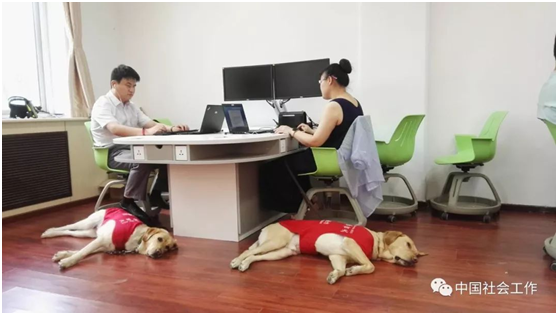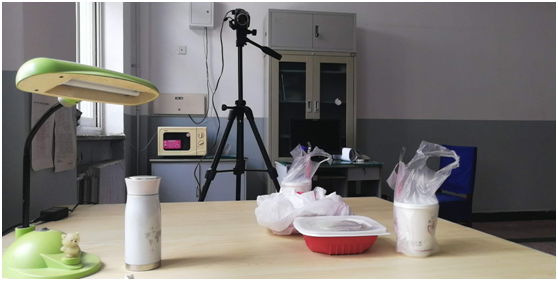Visually-impaired Chinese praise human resource ministry’s accessible exams
chinagate.cn,March 11, 2019 Adjust font size:

Wang Zhihua (left) and Zhou Tong,who have visual impairment, attended the national social work license exam. [Photo by China Social Work]
The Ministry of Human Resources and Social Security (MOHRSS) allowed visually-impaired people attended the national social work license exams with computers and screen readers in 2018. Thirty four people with visual-impairment across China completed the first exam to become qualified social workers.
Just last year, seven visually-impaired staff from Beijing Sound Wave Disabled Persons’ Social Service Center, an advocacy group, applied for the exam and requested aids such as braille, electronic papers, papers in large print, magnifying equipment, white canes, guide dogs in the examination room, and extra exam time.
MOHRSS didn’t approve applications for extra exam time, braille and electronic papers, but it provided partially-sighted examinees with large-print test papers and each blind examinee with an individual examination room and four assistants —two to take turns reading the exam papers, one to write down answers and one to monitor.
The director of the exam center in MOHRSS paid a visit to Sound Wave following the exam. He observed how visually-impaired people work and listened to their suggestions on how to better support visually-impaired examinees.
“Although the volunteers were happy to read for me, I would feel more independent and comfortable if I were able to listen to an electronic paper,” said Yang Qingfeng, head of Sound Wave and one of the examinees.
Jiang Jiaping and Bai Xiaowan, two other examinees, were unable to complete the examinations in the allotted time, due to the problem with the answer sheets. Although Jiang and Bai’s test papers were in large print, they still need to mark their answers into regular answer sheets, so that their answers could be scored by computers.
“Just imagine the answer options for 120 questions squeezed onto this sheet—how small and close they were!” Jiang said. “Even worse, they were in light green, making it more difficult for me to mark my intended answers.”
Jiang and Bai suggested that high-contrast, and large-print answer sheets be provided in the future.
Having listened to their suggestions, staff of the ministry looked at the type of screen reader staff at Sound Wave use, and decided on a trial run. When it prepared the exam this year, the ministry consulted Sound Wave again, drafted a detailed plan, then asked all its branch offices across China to follow the guidelines.
This year, MOHRSS’ Beijing office received eleven applications from people with visual impairment. Eight applied to attend the exam using the computer, while the rest requested large-print test papers. MOHRSS’ offices in Shanghai, Guangzhou, Wuhan, Sichuan, Ningxia, Gansu and other cities also received such requests.
MOHRSS’ Beijing office provided a computer room for the eight examinees and asked them to test the screen reading software five days prior to the exam.
The electronic transcripts were encrypted and stored on CDs. These CDs were then enclosed in envelopes and came enclosed with exam papers for sighted examinees. MOHRSS’ volunteers, one for each examinee copied the electronic transcrips onto the computer and created word documents for examinees to answer. After the exam, volunteers printed out their answers and asked the examinees to sign their names or fingerprint, depending on their eyesight, on each sheet of paper. Then, the volunteers helped examinees mark their answers into palm-sized answer sheets. All these documents were handed in for scoring, tracking and archiving.
Wang Zhihua, who failed the exam in 2017, was among this year’s examinees.
“I felt uncomfortable asking the volunteer to read for me repeatedly, but I can listen to electronic papers back and forth as I need,” he said.
According to Wang, whereas he barely finished on time last year, this year he completed the questions with 20 minutes left and managed to check over his answers.

On Ma Wei’s desk places a lamp, Ma’s lunch and a camera for MOHRSS’ supervision center to invigilate her exam room. Ma Wei is a partially-sighted examinee attending this year’s national social work license exam. MOHRSS provided her with a separate exam room and allows her to have lunch and rest in the room during breaks. [Photo by Ma Wei]
Ma Wei, who has partial vision, is also one of the examinees. She requested an exam with large printand asked to sit in a bright place. MOHRSS allowed her to use a teachers’ office, where the desk had a lamp. A surveillance camera was also placed there to allow MOHRSS to invigilate her exam.
“I was really touched by the fact that the staff placed a chair on each side of the desk, and asked me where I’d prefer to sit and write,” she said.
Bai, who was the one to suggest offering larger answer sheets, also attended the exam in 2018. She completed the exams in a regular exam room with sighted examinees. Due to her color-blindness, the light green answer sheets proved to be a challenge. MOHRSS allowed her to write answers on a white paper, which were then copied onto an answer sheet by a volunteer.
“I didn’t complete all the questions last year because I didn’t know if I marked the intended option, and wasted a lot of time,” Bai said.
“MOHRSS accepted our suggestion to provide assistance according to different visually-impaired examinees’ needs, which means it was not just limited to electronic or papers in large print,” said Cai Cong, who is in charge of disability projects in Youren Foundation, another advocacy group for people with disabilities.
This year, Cai’s organization converted the study materials, which was published by MOHRSS, into digital versions so that people with visual impairment can access them to prepare for the exam.
“We believe that MOHRSS will provide electronic learning materials for the visually impaired next year,” Cai said.
Translated by Jin Ling